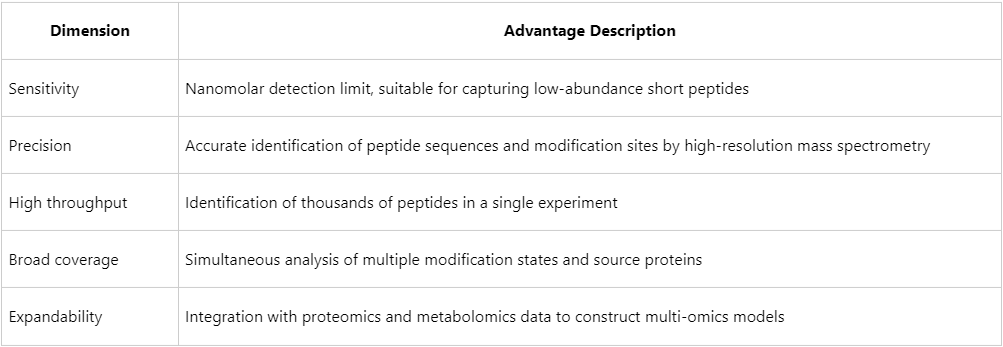How to Perform High-Throughput Peptidomic Analysis with LC-MS/MS?
-
Neuroscience: Analysis of neurotransmitter peptides and memory-regulating peptides (e.g., neuropeptide Y)
-
Cancer Research: Identification of tumor-associated cleavage peptides, neoantigens, and microenvironmental signaling peptides
-
Immunology: Integration with HLA peptidomics to elucidate immune recognition mechanisms
-
Metabolic Disorders: Discovery of endocrine-regulating peptides and their links to metabolic pathways
-
Pharmacodynamics: Monitoring dynamic changes in peptide expression profiles before and after pharmacological interventions
-
Processing of diverse sample types (tissue, liquid, cellular, etc.)
-
Optimization of enrichment strategies and customized magnetic bead protocols
-
High-resolution LC-MS/MS platforms (Orbitrap Exploris, Q Exactive, etc.)
-
Flexible acquisition modes including DDA, DIA, and PRM
-
Multi-dimensional differential analysis, pathway enrichment, and network construction
-
Integration with proteomics, metabolomics, and transcriptomics analyses
Peptidomics is a scientific discipline focused on the study of endogenous peptides (typically <10 kDa) present in biological specimens. These peptides play critical roles in diverse physiological processes, including neurotransmission, immune response, hormonal signaling, and metabolic regulation, and hold substantial potential as functional molecules and biomarkers. Compared with proteomics, peptidomics provides a closer reflection of the actual states of protein cleavage, processing, and post-translational modifications, offering a sensitive indicator of dynamic biological regulation. However, due to their short length, low abundance, and structural heterogeneity, peptidomic research remains highly challenging.
Liquid chromatography–tandem mass spectrometry (LC-MS/MS) has emerged as the pivotal technical platform for overcoming these challenges in high-throughput peptidomic analysis. This approach enables precise peptide sequence identification while offering high throughput, broad coverage, and the capacity for parallel multi-sample comparative analysis.
Role of LC-MS/MS in High-Throughput Peptidomic Analysis
1. What Is LC-MS/MS?
(1) LC (Liquid Chromatography): Separates complex peptide mixtures and delivers them into the mass spectrometer according to hydrophilicity/hydrophobicity, thereby improving identification efficiency.
(2) MS (Mass Spectrometry): Determines the mass-to-charge ratio (m/z) of peptides, allowing preliminary estimation of molecular weight.
(3) MS/MS (Tandem MS): Induces fragmentation of target peptides and detects the resulting fragment ion patterns to deduce amino acid sequences.
In peptidomics, LC-MS/MS encompasses the complete workflow from separation to identification and quantification of endogenous peptides in complex biological matrices.
Comprehensive Workflow of High-Throughput Peptidomic Analysis
1. Sample Collection and Peptide Enrichment
Endogenous peptides can be obtained from a wide range of sample types, including:
(1) Serum/plasma
(2) Urine
(3) Cerebrospinal fluid
(4) Tissue homogenates
(5) Cell culture supernatants or lysates
Enrichment Strategy:

MtoZ Biolabs employs a multi-strategy enrichment approach to enhance the capture efficiency of short peptides and diverse peptide modifications.
2. Liquid Chromatography Separation (LC)
Given the diversity and complex retention behavior of endogenous peptides, the LC stage focuses on separating peptides based on physicochemical properties prior to MS analysis, thereby enhancing identification depth.
(1) Nano-flow LC systems (e.g., EASY-nLC 1200) are used to increase sensitivity.
(2) C18 reversed-phase columns with water–acetonitrile gradient elution are commonly employed.
(3) Separation typically lasts 60–120 minutes to balance throughput with depth of coverage.
3. Tandem Mass Spectrometry Acquisition (MS/MS)
Acquisition Modes:

MtoZ Biolabs supports combined DDA and DIA acquisition, integrated with peptide database-assisted identification, to improve peptide resolution and coverage.
4. Data Processing and Peptide Identification
(1) Database Search
Search engines such as PEAKS, MaxQuant, and Spectronaut are used for peptide-spectrum matching. Searches can be conducted against UniProt, Swiss-Prot, and RefSeq databases, with support for customized searches of atypical N-terminal peptides, modified peptides, and spliced peptides.
(2) Quantitative Analysis
Available quantitation strategies include label-free, iTRAQ, and TMT. Differential peptides are screened by combining fold change, P-value, and false discovery rate (FDR) control.
(3) Functional Annotation
Functional analyses include GO enrichment, KEGG pathway mapping, and protein–peptide reverse tracing, enabling the construction of a three-tier network linking peptide–parent protein–functional pathway.
Technical Advantages of LC-MS/MS in High-Throughput Peptidomics

Research Applications of LC-MS/MS-Based Peptidomics
MtoZ Biolabs: End-to-End High-Throughput Peptidomic Analysis Services
As a leading multi-omics service provider, MtoZ Biolabs offers one-stop LC-MS/MS peptidomics solutions, covering:
Peptidomics offers a multidimensional perspective for deciphering complex biological processes, and LC-MS/MS serves as the key analytical tool for separating, identifying, and quantifying peptides from complex mixtures. It enables the elucidation of protein processing pathways, functional peptide expression profiles, and mechanisms of pathological regulation. Leveraging advanced mass spectrometry platforms, an experienced bioinformatics team, and a rigorous service framework, MtoZ Biolabs is committed to helping researchers maximize the scientific potential of high-throughput peptidomic analysis.
MtoZ Biolabs, an integrated chromatography and mass spectrometry (MS) services provider.
Related Services
How to order?







